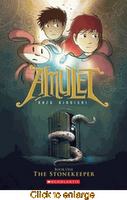
You may have noticed that I'm on a little graphic novel kick this fall. That's why I picked up Amulet Book One: The Stonekeeper by Kazu Kibuishi.
What really struck me about this book is how incredibly formulaic it is. The word "rigidly" might apply. In a prelude, a child sees her parent killed. At the real story opening, the rest of the family is heading off to a creepy new home (new homes are always bad news) that has been in the family for years. (As I was reading this today, I thought about how these days, old family homes are probably sold to create new subdivisions.) Immediately, the kids find a mysterious...um...piece of jewelry, are led into a strange world, and have to start a quest to save their surviving parent. (Did she seem just a little bit bitchie to anyone else?) A mysterious and brilliant ancestor figures into the story. (I'm not sure if that last part is original to this formula or if I just saw it in The Spiderwick Chronicles movie.) Some cute characters are thrown in as helpers.
Maybe there is some reason why adhering to formulas like this are important in children's literature. Isn't repetition of words and sounds supposed to help them learn to read? Maybe reading the same formula/pattern/storyline over and over again assists them in some way I've just never heard about.
As luck would have it, David Elzey has just reviewed the second book in this series at The Excelsior File. He liked it a great deal more than I liked the first one. In fact, if you do just a little bit of digging around on the Internet, you'll find that this is quite a well-regarded series.
3 comments:
I, too, found this volume very familiar, and was surprised at the praise it’s garnered. I haven’t been motivated to seek out the second volume, though if it falls into my hands I expect I’ll read it just to see if it contains anything new.
I wonder about this often--how many things we see as formulaic, "old" don't feel that way to a child reading them--since they don't have X number of decades of this kind of reading behind them.
And I do remember, as a child, loving the familiar, loving that I could read a book and know I'd have fun with it the whole way through--and just being able to enjoy the escape and the variations on a comfortable theme.
Yes, I do realize that fifth graders in 2009 are not going to be aware that this kind of story line has been used many times before and will welcome it as new and fresh.
Except, kidlit writers and publishers repeat so many scenarios so frequently now that maybe at some point kids do recognize duplication. On the one hand, I get that children enjoy familiarity and take comfort in it. But on the other, do they learn to accept the same old, same old from this type of reading?
I've read that some children's editors don't consider originality a big issue in children's literature for the reasons we've discussed here. What does that mean for children's literature in general? That we just don't care about original thought? Are creative and original stories passed over in favor of reworks of other authors' work under the assumption that the originals sold so the remakes will, too?
Post a Comment